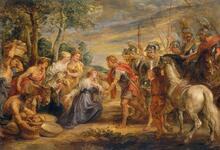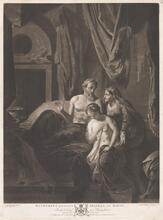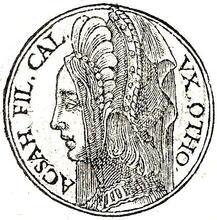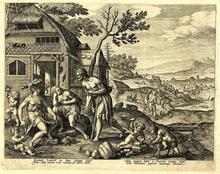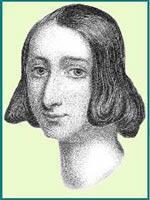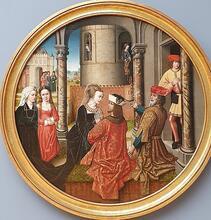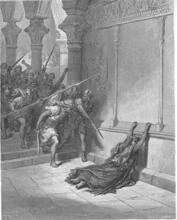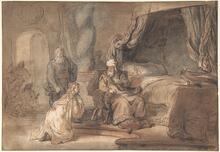Wise Woman of Abel-beth-maacah: Midrash and Aggadah
The wise woman from Abel-Beth-Maacah is identified in midrashim as Serah, daughter of Asher. The rabbis attribute great wisdom to her. She successfully instituted a negotiation with Joab, who had besieged the town of Abel-Beth-Maacah. She then spoke to the people of the town, who beheaded Sheba son of Bichri in order to induce Joab to leave. Rabbis draw parallels between her story and the story of Abraham negotiating with God for the people of Sodom. The wise woman from Abel-Beth-Maacah is greatly admired by many, including Solomon, who lauded her when he said: “Wisdom is more valuable than weapons of war”; this woman’s wisdom was superior to all of Joab’s weapons (Eccl. Rabbah loc. cit.).
Background
The Rabbis praise the wisdom of the woman from Abel-Beth-Maacah, to whom they attribute rhetorical skill, persuasiveness, and knowledge of the Torah she-bi-khetav: Lit. "the written Torah." The Bible; the Pentateuch; Tanakh (the Pentateuch, Prophets and Hagiographia)Torah and its laws. Their esteem is evident in the fact that the Rabbis expound almost every word that she uttered and ascribe significance to her statements far beyond what the Bible relates. The A type of non-halakhic literary activitiy of the Rabbis for interpreting non-legal material according to special principles of interpretation (hermeneutical rules).midrash applies to her the verse (Prov. 31:26): “Her mouth is full of wisdom,” since she saved the entire city with her wisdom (Midrash Eshet Hayil, Batei Midrashot, vol. 2).
Most midrashim identify this wise woman with Serah, daughter of Asher. Although Serah was Jacob’s granddaughter, she lived an extremely long life, to the time of King David. Some traditions go so far as to assert that she entered the Garden of Eden while still alive (see Serah Daughter of Asher).
Parley with Joab
In the scene set forth in II Sam. 20:17, when Joab approaches the wall of the besieged town of Abel-Beth-Maacah, the wise woman asks him, “Are you Joab?” In the midrashic elaboration, this was a reproach: “Your name is Joab [yo-av]? Your name does not suit you! It teaches that you are a father [av] to Israel, yet you kill them.” Furthermore, “Are you among David’s wise heroes whom Scripture praises with the words [II Sam. 23:8]: ‘Josheb-basshebeth, a Tahchemonite [literally, you are sitting in the seat of wisdom]?’ But you do not act wisely!” She continued, in the following verse [20:18]: “In olden times people used to say, ‘Let them inquire of Abel,’ and that [ve-khen] was the end of the matter.” The midrash understands “and that was the end of the matter” as meaning: Words of Torah came to an end here [kan]: you are not intimate with the Torah and David is not intimate with the Torah. For it is written in Deut. 20:10: “When you approach a town to attack it, you shall offer it terms of peace.” According to the rules of war, you must address a verbal appeal to the city before you attack it [the Hebrew for “people used to say, ‘Let them inquire of Abel’” could also be read as]: “You shall surely speak first, you shall surely inquire of Abel.” Joab asked her: “Who are you?,” to which she replied [v. 19]: “I am one of those who seek the welfare of the faithful [shelomei emunei] in Israel,” which the Rabbis interpret as meaning: I am one of the Israelites who went down to Egypt with Jacob. I completed [shelumai] the count of Israel [emunei Yisrael; a wordplay on the root shlm, referring both to peace-welfare and completion] to the seventy souls that went down to Egypt. Do you want to kill the entire city, and also me, who am a mother in Israel [em—emunei, i.e., an important woman]? As noted above, the midrash identifies the wise woman with Serah daughter of Asher, who was counted among those who went down to Egypt in Gen. 46:17.
Joab immediately replied (v. 20): “Far be it, far be it from me.” The Rabbis referred to Joab’s repeated phrase: “Far be it from me, far be it from David, far be it from his kingdom. It is Sheba son of Bichri, a scoundrel, a flawed individual (physically as well) and an idolater, whom I seek.” The woman told him: “Stand where you are, and I will bring you his head, and the entire city will be at peace.” The Rabbis ask how the woman knew, before she asked them, that the townspeople would behead Sheba son of Bichri. The Rabbis respond that this answer also indicates her wisdom. She knew that whoever rebelled against the Davidic monarchy was sentenced by Heaven to have his head detached from his body. Sheba son of Bichri, who rebelled against David, would receive his just deserts by being killed and beheaded.
Speaking to the People
The woman then went to the people and told them: “Know that Joab and all Israel are assembled outside the town and seek to kill us, our sons and our daughters.” They asked her: “And what do they want?” She answered: “To kill one thousand people. Is it not worthwhile to give a thousand people, to save the entire city from destruction?” They responded: “Each one will give according to what he has.” She continued: “Perhaps Joab will go down from the number that he demanded if we mollify him.” She pretended to be on her way to appease him and then returned and told the townspeople: “Joab has been mollified, and now he wants five hundred people, instead of a thousand. But perhaps if I appease him he will go down from this number.” So she went and returned, and said that he had been placated and anted only a hundred, and then, only ten. Finally, she said to them: “He only wants one man, who is a lodger [i.e., not from our city].” They asked her: “And who is he?” She replied: “Sheba son of Bichri.” The townspeople immediately went and cut off Sheba son of Bichri’s head, and gave it to Joab. The threat of war was lifted from the town, and Joab left without harming them (Gen. Rabbah 94:9; Eccl. Rabbah 9:18:2; Tanhuma [ed. Buber], Vayera 12; Midrash ha-Gadol, Vayigash, Gen. 46:26–27).
The Rabbis compare this woman’s astuteness to the wisdom of Abraham when he came before God to plead for Sodom (Gen. Rabbah loc. cit.). Solomon lauded the wise woman from Abel-Beth-Maacah when he said (Eccl. 9:18): “Wisdom is more valuable than weapons of war”; this woman’s wisdom was superior to all of Joab’s weapons (Eccl. Rabbah loc. cit.).

